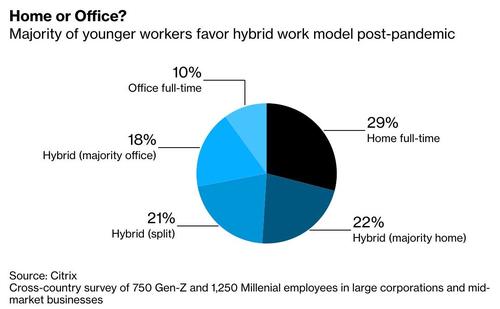Fears Of Missing Out (On Promotions) Is Pushing More Young Workers Back To The Office
If you ask most American white-collar workers about the last 16 months or so, most will probably confirm that working from home was one of the few silver linings of a once-in-a-century pandemic. But as bankers from JPM, Goldman and others return to the office, other white collar employees might see last repercussions for their careers if they continue to work 100% remote.
In fact, a recent study seemed to confirm exactly that: workers who linger home too long might miss out on an important path to promotions and higher income.
Before we blame younger workers for malingering, let's remember it was young white-collar workers like the overworked Goldman analysts who saw the brunt of the negatives of remote work. Many reported feeling pressured to stay at their desks all day and night. Remember those junior Goldman analysts who went public with their claims?
Many younger workers are voluntarily returning to the office, according to Bloomberg.
Why? Because while they value the quality of life they have working from home, they're also worried about the long-term damage to their careers. And as more firms call workers back to the office, younger workers are generally among the first and the most eager.
This is all reflected in a new survey from Sharp Corp, which shows that nearly 60% of respondents said working in a modern, collegiate office environment has become more important to them over the past year. Even though a majority of respondents under 30 say remote work made them more productive, more than half of the survey’s respondents across Europe (ranging in age from 18 to 45) say they feel anxious about a lack of training and career opportunities when thinking long-term about the future of work.
According to the survey, more than half of workers aged 21-30 stressed the importance of being able to collaboratively work with colleagues in person.
Nearly 60% of respondents said that working in a "modern, collegiate office environment" is more important to them now thanks to the pandemic.
What's more, some 60% of workers between the ages of 18 and 40 would prefer hybrid work model.
Sophia McCully, a 28-year-old working in public policy research, has worked from home ever since starting her current role. She believes the enforced isolation has had a significant impact on her professional development.
"I think the ability to make those connections and network has been more difficult,” McCully said. Starting a new job in a virtual setting also made it "harder to get yourself across," at least at first.
Still, while young workers may crave in-person connections and relief from pressures on their health and wellbeing, they remain skeptical of returning to the status quo before Covid-19. Instead they are looking for value and purpose in office-based activities while retaining the right to work remotely. McCully said working from home allowed her to spend time with her young child while remaining professionally productive, and wants that to remain an option.
Unfortunately for the many workers who prefer working from home, those who don't ever report to the office miss out on developing important 'soft' skills. Which is why some consultants are pushing their clients to require new hires to report to the office, at least for the first few months.
Helen Jamieson, managing director of human resources consultancy Jaluch, who has focused on hybrid solutions for over a decade, says young workers who may still wish to work mostly at home “don’t understand what they may be missing” in terms of long-term career development.
Jamieson advocates dedicated “collaboration days,” and suggests that new hires and young staff could work mostly from offices during their first six months, before opening up work-from-home options.
The calculus, Jamieson says, is to set aside personal preferences and focus on balancing business needs with a strategy for staff engagement and retention. “Because quite frankly if companies don’t look after young people, they’ll lose them.”
In other words, young workers who continue to work 100% remote might see their careers suffer for it.
https://ift.tt/3wBwWTA
from ZeroHedge News https://ift.tt/3wBwWTA
via IFTTT



0 comments
Post a Comment